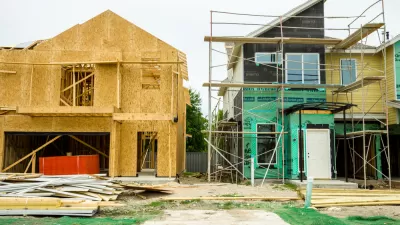NIMBYism is obstructing the urban planning process, according to architect and New Urbanist Andres Duany. He suggests changing the public participation process to unclog the system.
In this interview from Architect, Diana Lind talks with Duany about the problems associated with public participation and how they can negatively affect the planning process.
"Diana Lind: Is there a better way to get public participation in the design process without a project falling prey to local interests?
Andres Duany: Conventional public participation makes the mistake of privileging the neighbors, the people who live within a half-mile of the given proposal. So it becomes extremely difficult to, say, locate a school or an infill project. While democracy doesn't need a great number of voters to function well, it does require a full cross-section to participate. That is the source of its collective intelligence. You can't confuse neighbors with the community as a whole.
We propose using the jury pool or the phone book to invite a random group, which is then understood to be apart from the self-interested neighbors, just as the developer or the school board are acknowledged as vested interests. The neighbors must be seen as vested interests as well."
FULL STORY: Control the Masses

Maui's Vacation Rental Debate Turns Ugly
Verbal attacks, misinformation campaigns and fistfights plague a high-stakes debate to convert thousands of vacation rentals into long-term housing.

Planetizen Federal Action Tracker
A weekly monitor of how Trump’s orders and actions are impacting planners and planning in America.

In Urban Planning, AI Prompting Could be the New Design Thinking
Creativity has long been key to great urban design. What if we see AI as our new creative partner?

King County Supportive Housing Program Offers Hope for Unhoused Residents
The county is taking a ‘Housing First’ approach that prioritizes getting people into housing, then offering wraparound supportive services.

Researchers Use AI to Get Clearer Picture of US Housing
Analysts are using artificial intelligence to supercharge their research by allowing them to comb through data faster. Though these AI tools can be error prone, they save time and housing researchers are optimistic about the future.

Making Shared Micromobility More Inclusive
Cities and shared mobility system operators can do more to include people with disabilities in planning and operations, per a new report.
Urban Design for Planners 1: Software Tools
This six-course series explores essential urban design concepts using open source software and equips planners with the tools they need to participate fully in the urban design process.
Planning for Universal Design
Learn the tools for implementing Universal Design in planning regulations.
planning NEXT
Appalachian Highlands Housing Partners
Mpact (founded as Rail~Volution)
City of Camden Redevelopment Agency
City of Astoria
City of Portland
City of Laramie





























